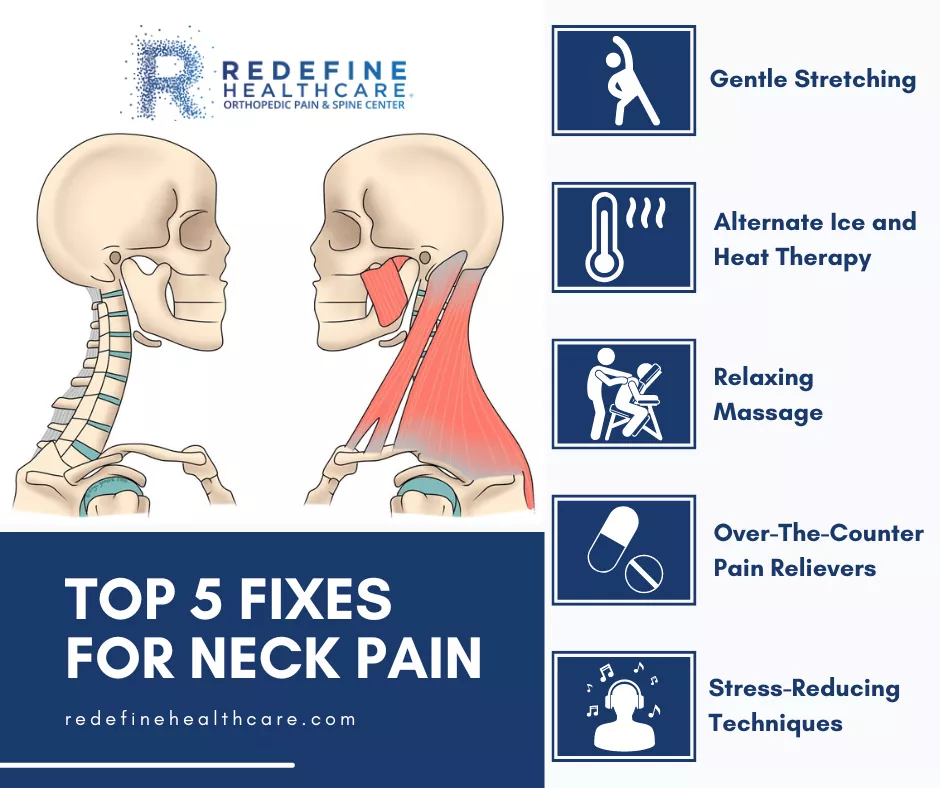Neck pain typically lasts a few days to a few weeks. Chronic neck pain can persist for months or longer.
Neck pain affects many people due to various causes like poor posture, stress, or injuries. It can be acute, lasting a short time, or chronic, persisting for months. Identifying the underlying cause is crucial for effective treatment. Simple lifestyle changes, such as proper ergonomics and regular exercise, often help alleviate symptoms.
In some cases, medical intervention is necessary. Consulting a healthcare provider can offer tailored advice and treatment options. Understanding the duration and causes of neck pain aids in managing and preventing future occurrences, ensuring better overall health and well-being.
Common Causes
Neck pain is a common problem. Understanding its causes helps in managing it effectively. Here are some of the most common causes of neck pain:
Poor Posture
Poor posture is a leading cause of neck pain. Sitting or standing incorrectly strains neck muscles. Using devices like phones and computers often causes poor posture. This condition is sometimes referred to as “tech neck.” It happens when you look down at screens for long periods.
Here are some signs of poor posture:
- Rounded shoulders
- Forward head position
- Hunched back
Correcting your posture can reduce neck pain. Here are some tips:
- Keep your screen at eye level
- Sit with your back straight
- Take breaks and stretch
Injury And Trauma
Neck injuries and trauma are other common causes of neck pain. Car accidents often result in whiplash. Sports injuries can also affect the neck. Even minor falls can cause neck strain.
Common symptoms of neck injuries include:
- Stiffness
- Sharp pain
- Limited range of motion
If you experience these symptoms, seek medical attention. Early treatment can prevent further damage.
| Cause | Common Signs | Tips for Relief |
|---|---|---|
| Poor Posture | Rounded shoulders, forward head, hunched back | Keep screen at eye level, sit straight, take breaks |
| Injury and Trauma | Stiffness, sharp pain, limited motion | Seek medical attention, early treatment |
:max_bytes(150000):strip_icc()/most-common-neck-injuries-described-296664_v4-HL-e923c5eb867744f89b62591a1dbd4dcf.png)
Credit: www.verywellhealth.com
Types Of Neck Pain
Neck pain can vary in intensity and duration. It’s important to understand the two main types of neck pain: acute and chronic. Each type has unique characteristics and requires different treatments.
Acute Pain
Acute neck pain often arises suddenly. It can be due to a strain, injury, or sudden movement. This type of pain usually lasts for a few days to a few weeks.
Common causes include:
- Muscle strain from poor posture
- Sleeping in an awkward position
- Sudden jerks or accidents
Acute pain often improves with rest and over-the-counter medications. Simple exercises and stretching can also help.
Chronic Pain
Chronic neck pain persists for more than three months. It’s often the result of underlying health issues or long-term wear and tear.
Common causes include:
- Arthritis
- Degenerative disc disease
- Chronic poor posture
Chronic pain may require more intensive treatments. This can include physical therapy, prescription medications, or even surgery in severe cases. Managing stress and maintaining good posture can help prevent chronic pain.
| Type of Neck Pain | Duration | Common Causes | Treatments |
|---|---|---|---|
| Acute Pain | Few days to few weeks | Muscle strainInjurySudden movement | RestOTC medicationsStretching |
| Chronic Pain | More than three months | ArthritisDisc diseasePoor posture | Physical therapyPrescription medicationsSurgery (severe cases) |
Symptoms To Watch
Neck pain can vary widely in its intensity and duration. Understanding the symptoms can help you manage it better. Here, we discuss the physical and neurological signs to watch.
Physical Symptoms
Physical symptoms of neck pain are often the most noticeable. These can include:
- Stiffness: Difficulty in moving your neck.
- Tenderness: Pain when touching the affected area.
- Muscle Spasms: Uncontrollable contractions of neck muscles.
- Reduced Range of Motion: Limited ability to turn your head.
These symptoms can affect daily activities. Activities like driving or working on a computer can become challenging.
Neurological Signs
Neurological signs are less common but can be more serious. These signs may indicate nerve involvement. They include:
- Radiating Pain: Pain that spreads to shoulders or arms.
- Numbness: Loss of sensation in the arms or hands.
- Weakness: Reduced strength in your arms or hands.
- Tingling: A pins-and-needles sensation in the limbs.
These symptoms require prompt medical attention. They may indicate conditions like a herniated disc or spinal stenosis.

Credit: www.metrohealthnyc.com
Diagnosis Methods
Understanding the cause of neck pain is essential for proper treatment. Effective diagnosis methods help pinpoint the root cause. Here, we explore key diagnostic techniques used by medical professionals.
Imaging Tests
Doctors often use imaging tests to diagnose neck pain. These tests provide a clear view of the neck’s internal structure.
- X-rays: Show bone structure and any misalignments.
- MRI: Offers detailed images of soft tissues, including muscles and ligaments.
- CT Scans: Provide a more comprehensive view than X-rays.
These imaging tests help identify fractures, disc issues, and other abnormalities.
Physical Exams
A physical exam is crucial for assessing neck pain. Doctors evaluate the range of motion, muscle strength, and reflexes.
- Range of Motion: Tests how far you can move your neck in different directions.
- Muscle Strength: Checks for weakness in the neck and shoulders.
- Reflex Tests: Identify nerve issues causing the pain.
Doctors may also palpate the neck to feel for tenderness or swelling. These exams provide valuable insights into the underlying causes of neck pain.
Treatment Options
Neck pain can be a real nuisance. Understanding treatment options is crucial. Knowing what works best helps ease the discomfort faster.
Medications
Medications play a vital role in managing neck pain. Over-the-counter pain relievers like ibuprofen and acetaminophen are often the first choice. These can reduce pain and inflammation.
For more severe pain, doctors might prescribe muscle relaxants. These help to ease muscle spasms. In some cases, stronger painkillers may be necessary. Always follow a doctor’s advice when using prescription medications.
Sometimes, corticosteroid injections are used. These reduce inflammation and provide relief. It’s important to note that injections are usually for short-term relief.
Physical Therapy
Physical therapy is another effective treatment option. A physical therapist can create a personalized exercise plan. These exercises strengthen neck muscles and improve flexibility.
Therapy sessions often include manual techniques. Therapists use their hands to manipulate the neck muscles and joints. This can greatly reduce pain and stiffness.
Physical therapy may also involve modalities like ultrasound and electrical stimulation. These help to reduce pain and promote healing.
Sometimes, therapists teach posture improvement. Good posture reduces strain on neck muscles. Learning ergonomic adjustments for daily activities can prevent further pain.
Home Remedies
Neck pain can be annoying and disrupt daily activities. Luckily, there are simple home remedies to help ease the discomfort. Many people find relief through basic treatments that can be done at home. The following sections cover some effective methods.
Hot And Cold Therapy
Hot and cold therapy is a common way to relieve neck pain. It helps reduce inflammation and relax muscles. For cold therapy, use an ice pack wrapped in a towel. Apply it to the painful area for 15-20 minutes.
For heat therapy, use a heating pad or warm towel. Apply it to the neck for 15-20 minutes. Alternating between hot and cold can be very effective. This method can be repeated several times a day.
Exercise And Stretching
Simple exercises and stretching can help reduce neck pain. Gentle stretches improve flexibility and reduce muscle tension. Here are some easy stretches to try:
- Neck Tilt: Slowly tilt your head towards your shoulder. Hold for 5 seconds. Repeat on the other side.
- Neck Turn: Turn your head to the left. Hold for 5 seconds. Repeat on the right side.
- Shoulder Shrug: Raise your shoulders towards your ears. Hold for 5 seconds, then relax.
Perform these exercises daily to help ease neck pain. Always do them gently to avoid further strain.
When To See A Doctor
Neck pain can be troublesome, impacting daily activities and overall well-being. Knowing when to seek medical help is crucial. Here, we discuss the signs that indicate it’s time to visit a doctor.
Persistent Pain
If neck pain lasts longer than a week, it may be serious. Short-term pain often resolves with rest and self-care. Persistent pain might signal an underlying issue.
- Stiffness that doesn’t improve
- Limited range of motion
- Discomfort that interferes with sleep
Monitor your symptoms closely. If there’s no improvement, consult a doctor. Ignoring persistent pain may lead to complications.
Severe Symptoms
Severe symptoms should never be ignored. These can indicate a more serious condition. Seek immediate medical attention if you experience:
- Sharp, shooting pain
- Numbness or tingling in arms
- Loss of bladder or bowel control
These symptoms could point to nerve damage or other severe issues. Early intervention can prevent further damage and improve recovery.
| Symptom | Action |
|---|---|
| Persistent pain | See a doctor if it lasts over a week |
| Severe symptoms | Seek immediate medical attention |
Understanding when to see a doctor can make a significant difference. Early diagnosis and treatment lead to better outcomes and a quicker return to normal activities.

Credit: redefinehealthcare.com
Preventive Measures
Neck pain can be a real nuisance, disrupting daily life. Preventive measures can help reduce the risk of neck pain. Here are some effective strategies to maintain a healthy neck.
Ergonomic Adjustments
Making ergonomic adjustments at work and home is vital. Ensure your computer screen is at eye level. This reduces strain on your neck. Use a chair that supports your lower back. This promotes good posture.
Keep your feet flat on the floor while sitting. This helps align your spine. Consider using a standing desk. Alternate between sitting and standing to avoid prolonged stress on your neck.
Use a hands-free device for phone calls. Holding the phone between your ear and shoulder can cause neck pain. Arrange your workstation so that frequently used items are within reach. This prevents you from straining your neck by reaching too far.
Regular Exercise
Engaging in regular exercise strengthens neck muscles. This can prevent pain and stiffness. Start with simple neck stretches. Tilt your head forward, backward, and side to side. Hold each position for a few seconds.
Incorporate shoulder shrugs and rotations into your routine. These exercises relieve tension in your neck and shoulders. Practice gentle yoga poses like the Cat-Cow stretch. This promotes flexibility and reduces neck stress.
Aerobic exercises like walking or swimming improve overall fitness. A strong body supports a healthy neck. Ensure to cool down after exercise. This helps prevent muscle stiffness.
| Exercise | Benefits |
|---|---|
| Neck Stretches | Improves flexibility and reduces stiffness |
| Shoulder Shrugs | Relieves tension in neck and shoulders |
| Cat-Cow Stretch | Promotes flexibility and reduces stress |
| Walking | Improves overall fitness |
| Swimming | Strengthens muscles without strain |
By incorporating these preventive measures, you can significantly reduce the risk of neck pain. Small changes can make a big difference in maintaining neck health.
Frequently Asked Questions
What Causes Neck Pain?
Neck pain can result from poor posture, muscle strain, or injuries. Conditions like arthritis, herniated discs, or pinched nerves also contribute. Regular stretching and maintaining good posture can help prevent it.
How Long Does Neck Pain Last?
Neck pain often lasts a few days to a few weeks. Chronic cases may persist longer. Treatment and lifestyle changes can speed up recovery.
Can Stress Cause Neck Pain?
Yes, stress can cause neck pain. Stress often leads to muscle tension and tightness. Managing stress through relaxation techniques can help alleviate neck pain.
When Should I See A Doctor For Neck Pain?
Consult a doctor if neck pain persists for more than a few weeks. Seek immediate medical attention for severe pain or if accompanied by neurological symptoms.
Conclusion
Neck pain duration varies based on the cause and treatment. Simple strains heal in days, while chronic issues last longer. Seeking medical advice ensures proper care and faster recovery. Remember, addressing neck pain promptly can prevent further complications. Stay mindful of posture and daily habits to maintain neck health.

